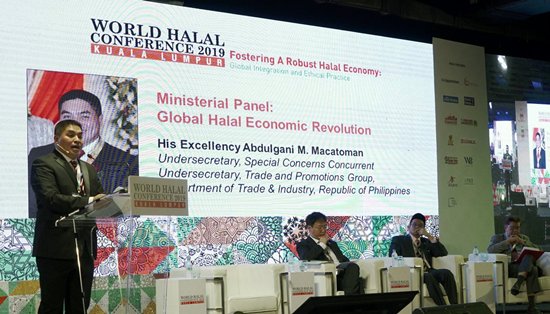A new milestone
in Philippine Halal Industry

By
DTI-TPG
April 11, 2019
MAKATI CITY – The
Department of Industry Trade Promotions brought the Philippine Halal
Industry in the map of the US$ 3.2 trillion world halal market.
Speaking before the just concluded World Halal Conference (April
3-4, 2019) in Kuala Lumpur, Malaysia, Department of Trade and
Industry (DTI) Undersecretary Abdulgani M. Macatoman told the
conference that the Philippines is embarking on a massive policy
revitalization to boost the Philippine Halal Industry in order to
become a big player in the halal market in the areas of halal food,
pharmaceuticals, tourism, and Islamic Finance.
Rather than falling behind
in the Fourth Industrial Revolution where human capacity is greatly
enhanced, he said that the global halal industry should initiate an
economic revolution to maximize its benefits for the improvement of
the standard of living of mankind. He further said that halal market
is not only for the estimated 2 billion Muslims, some one-fourth of
world population, but for every person who desires healthy food and
ethical standards in food consumption and business relationships.
The DTI Trade Promotions
and Special Concerns Group, headed by USec. Macatoman, seeks strong
policy direction for international recognition of halal food
products from the Philippines by seeking wider international
recognition of Philippine halal certification with certifying bodies
in other Muslim countries. At the moment, of the nine certifying
bodies recognized by the Philippine Halal Board, only three are
recognized in Malaysia. The Gulf countries are still selectively
accepting halal foods, condiments, and pharmaceuticals made in the
Philippines.
In this connection, USec.
Macatoman obtained commitment from the Ministry of International
Trade and Industry of Malaysia (MITI) to intensify halal trade
between the Philippines and Malaysia. At the same time, he
separately convinced the Halal Development Council of Malaysia to
support efforts in improving acceptability of halal foods from the
Philippines by improving local certification efforts in the country.
Together with MITI, they will convince JAKIM, the central
certification body of Malaysia, to recognize more certifying bodies
from the Philippines. This entails providing training in
certification and auditing procedures to prospective certifying
bodies in the Philippines under the Philippine Halal Board to
enhance unification of our halal certification standards with that
of Malaysia.
A major implication of
international recognition of halal certification from Philippine
certifiers impinges not only on halal food trade but also in
tourism. In order to tap Muslim tourists arriving in Malaysia to
include the Philippines among their destinations, Philippine
restaurants, hotels and other tourism facilities in the country
should be convinced to obtain halal certification. Because of this,
the DTI Second National Halal Industry Conference will be held in
Clark this May 2-3 in order to heighten awareness to halal
certification of food and tourism facilities to ensure more Muslim
tourist arrivals in the forthcoming Asian Games in December of this
year.